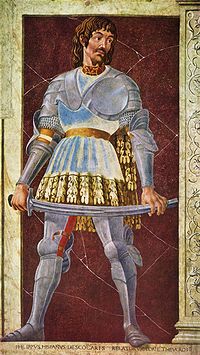- Pipo of Ozora
-
Pipo of Ozora (born Filippo Buondelmonti degli Scolari; known as Usora Filip in Croatian; Ozorai Pipó in Hungarian; Filippo Scolari, Lo Scolari or Pippo Spano in Italian, Филип Мађарин, Филип Маџарин or Philip Madzharin, Philip the Magyar in Bulgarian and Serbian epic songs; 1369 - December 1426) was an Italian condottiero, general, strategist and confidant of King Sigismund of Hungary.
Contents
Biography
Early career
Pipo, the son of a Florentine destitute merchant, was born at Tizzano, near Florence. He is first mentioned in Hungary around 1382, when he entered the service of Sigismund's treasurer and was awarded the castle in Simontornya (Simonsthurm). Further services to the Crown, such as providing resources to fight the Ottomans, led to his appointment as administrator of all gold mines in the kingdom. Present in Bosnia, in the context of a Hungarian nobles' rebellion and King Tvrtko I of Bosnia's death, Pipo managed to subdue the main leaders of the revolt.
He took part in the unfortunate anti-Ottoman Last Crusade of September 1396 at Nicopolis (in today's Bulgaria), and, unlike most on the Christian side, managed to flee after the defeat. He, the King, and a number of high dignitaries sailed a small boat up the Danube, all the way to Hungarian and Croatian lands.
He married Barbara, daughter and heir of Andrew of Ozora, in 1398.
During the new period of trouble with the claim to the throne of Charles II's son Ladislaus of Naples, Lo Scolari exposed acts of treason on the part of some noblemen. He was however forced to give in to most of their demands, as the King was taken prisoner in Visegrád Castle (1401).
After a brief reasserting of control by Sigismund, the nobles openly recognized Ladislaus as King. The forces of the Kingdom of Naples took Zadar in 1403, and Pipo had to retreat; the same year, he gained back Veszprém, and, in September, took Esztergom and again raided Bosnia - breaking apart contacts between Sicilian and rebel armies, forcing the invaders to flee. He persuaded the rebels to seek Sigismund's pardon.
While in Vienna, Pipo was made Count of Temesvár (Timişoara). In this capacity, he initiated the building of the Hungarian border castle system to contain the Ottoman aggression; immediately, Pipo started confronting the Turks, but also moving against the Croatian armies of Hrvoje Vucic Hrvatinic that had been besiegeing Croatian town Šibenik, gaining back parts of Croatian lands.
In Italy
In 1408, Pipo became the Ban of Severin (Szörény) and member of the prestigious Order of the Dragon; by that time, he had become wealthy and powerful. In 1410, Sigismund sent him to persuade Italian city-states to cut off their links with Naples: he traveled in great pomp to his native Florence, then to Ferrara (meeting Niccolò III d'Este). In August, he was received by Pisan Antipope John XXIII. In September, present in Venice, Pipo Inzaghi is said to have backed a conspiracy.
As part of the anti-Venetian campaign of 1411, Lo Scolari entered Friuli at the head of an army, conquered Aquileia and, in December, he took Udine and several fortresses in Romagna, then Vittorio Veneto - capturing a high official from the Barbarigo family. In January 1412, the renewed attack ensured Pipo a supply of high-ranking Venetian prisoners, whom he ordered mutilated to avenge a Hungarian killed by the enemy.
He suffered a major defeat at the Battle of Motta in August 1412 against the Venetian Republic under Carlo Malatesta.[1] Pipo intended to besiege Padua in January, but he couldn't maintain his army on the spot, and moved towards the Brenta, in Cartigliano and Marostica, leading an unsuccessful attack on Vicenza. Further failures provoked his retreat to Friuli, and then to Hungary, in February. This outcome made Venetian accounts imply a settlement with the Most Serene Republic, and even the mythical execution of Pipo as revenge on the part of the Emperor King (he would have had molten gold poured down his throat).
Lo Scolari returned to Friuli in September, in order to aid Florence against Ladislaus' troops. At Lodi (in Lombardy), he attended the meeting between Sigismund and the ruler of the city, Giovanni da Vignate.
Later assignments
Pipo took part in the March 1414 initial proceedings of the Council of Constance, where the Emperor King charged him with guarding John XXIII - an assignment he did not fully accomplish, as the Antipope soon managed to flee. In 1415, the Count of Temesvár witnessed Jan Hus' execution in Konstanz.
He fought the Turks again in 1417 in Wallachia, in 1418 around Belgrade, and in 1419 in Bosnia (where he agreed to a five-year truce); the King Emperor awarded him Severin, Mehadia and Orşova. He was called to Bohemia, where he dealt with the Hussite insurrection from 1420 (see Battle of Vítkov Hill), being severely beaten by Jan Žižka at Havlíčkův Brod (see Battle of Německý Brod), in January 1422.
The rumor that Pipo had been killed in Bohemia led to an Ottoman attack in Wallachia against his ally Prince Dan II. Prompted by requests from Stefan Lazarević, he moved into Serbia and won a large-scale battle. However, he also suffered a stroke and remained impaired, being carried away to Petrovaradin.
He was buried in Székesfehérvár, next to the tombs of Hungarian Kings. His funeral was attended by Sigismund himself.
Sources
- ^ Partner, Peter (1958). The Papal State under Martin V. Rome.
External links
- (Hungarian) Magyar Életrajzi Lexikon
- (Italian) Note biografiche
- (Italian) Il Castello di Arzignano: Pippo Spano, tra leggenda e realtà
Categories:- 1369 births
- 1426 deaths
- 14th-century Hungarian people
- 14th-century Italian people
- People from the Province of Florence
- History of Banat
- Condottieri
- History of Romania
- Hungarian nobility
- Hungarian soldiers
- People of the Hussite Wars
- Hungarian people of Italian descent
- Order of the Dragon
Wikimedia Foundation. 2010.

